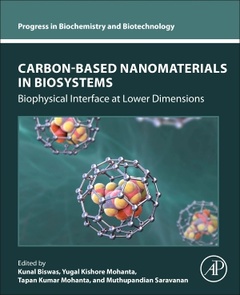Carbon-Based Nanomaterials in Biosystems Biophysical Interface at Lower Dimensions Progress in Biochemistry and Biotechnology Series
Coordonnateurs : Biswas Kunal, Mohanta Yugal Kishore, Mohanta Tapan Kumar, Saravanan Muthupandian

Carbon-Based Nanomaterials in Biosystems: Biophysical interface at Lower Dimensions provides a thoroughly comprehensive overview of all major aspects of carbon-based nanomaterials, their biophysical response, and biotechnological applications. The book articulates the underlying physics, chemistry, and the basic phenomenon of the broad-range carbon-based nanomaterials (CNMs) with biological systems, particularly the interface analysis. Organized in six sections, it discusses state-of art technological interventions of carbon-based nanomaterials and their application in biomedical sectors in healthcare, food sciences, and technology. The book also highlights the carrying capacity of different CNMs in payload efficiency mechanisms in various biomedical fields. The theranostic efficiency and the safety of various forms of CNMs is assessed. This book will be a helpful resource to those specializing in the areas of nanomedicine, bionanomaterials, and nanotechnology applications.
1. Introduction to the carbon-based nanomaterials and its unique electrochemical and physico-chemical properties
2. Synthesis, characterization, and applications of carbon nanomaterials from a nanobiotechnological perspective
3. Green carbon nanomaterials and its applications in food, agriculture, and biomedicine
4. Recent trends in the bottom-up and top down techniques in the synthesis and fabrication of myriad carbonaceous nanomaterials
Section 2: Carbon Based Nanomaterials in Food Industry
5. Implications of caged molecular structure of Buckminster fullerenes in food sciences and industry applications
6. Uncovering the unique attributes of two-dimensional graphene-based nanomaterials in food safety and practices
7. Role of different types of carbon nanotubes in food sciences and food sensing applications
Section 3: Role of Carbon-Based Nanomaterials in Agriculture
8. Role of isotropic buckyball carbonaceous materials of fullerenes in crop improvement and targeted pesticide management
9. Unconventional role of 2D graphene-based nanomaterials and their composites in crop improvements and novel fertilizers applications
10. Exploring the different anisotropic chirality-based carbon nanotubes and their organic/inorganic composites in rotten crop toxin sensing, prevention and shelf-life expansion
Section 4: Role of Carbon-Based Nanomaterials in Biomedicine
11. Evaluation of zero dimensional buckyball based fullerene molecules in targeted drug delivery applications in dreaded diseases
12. Role and development of unique 2-Dimensional graphene-based nanomaterials in anti-microbial and molecular theranostic applications
13. Recent trends and practices of bio-functionalized carbon nanotubes in bio-imaging and bio-sensing applications in biomedical sectors
14. Combating ‘diseases’, employing different forms of carbonaceous nanomaterials via ‘theranostic’ applications in clinical and biomedical sectors
Section 5: Carbon Nanomaterials-based Biosensors/Devices for Food, Agriculture and Biomedicines
15. Potentialities of zero-dimensional Fullerenes in designing bio-sensing modalities in crop, food toxin and biomedicines
16. Role of fabricated anisotropic graphene and nanotubes based electro-chemical sensors for food, crop damage surveillance and management
17. Unveiling the potential activities of myriad carbonaceous nanomaterials in scaling and fabrication of miniaturized, sensitive, and economical medical diagnostic kits
18. Role of different approaches of functionalization over carbonaceous nanomaterials in designing different sensor devices in food, crop, and biomedical sectors
Section 6: Toxicity assessment of different forms of Carbon-Based Nanomaterials: Safety, Health Evaluation (SHE)
19. Toxicological analysis of carbon-based nanomaterials in food industry applications
20. Risks associated with the clinical trials of carbon nanomaterials in agriculture domains (Soil nutrients/ Soil microbial diversity)
21. Safety matters pertaining to carbon-based nanomaterials in drug designing for targeted drug delivery in biomedical sciences
Dr. Yugal Kishore Mohanta is an Assistant Professor in the Department of Applied Biology, School of Biological Sciences at the University of Science and Technology Meghalaya (USTM). His current research is green nanoparticles and its potential application in food and biomedicine. He earned his PhD in Life Sciences from North Orissa University, Baripada. He has also successfully completed the BCIL industrial training programme on Plant Tissue Culture sponsored by the Department of Biotechnology. Among other academic/research achievements, he was awarded as visiting research scholar at Department of Biology, KU Leuven, Belgium sponsored by KU Leuven. He has more than ten years research experience on natural products chemistry and nanobiotechnology. He has published in peer-reviewed SCI-indexed journals like BMC Plant Biology, Frontiers in Microbiology, Molecules, Frontiers on Plant science, Frontiers in molecular biosciences
- Covers major breakthroughs in carbon nanomaterials (CNMs)
- Distinguishes between the advantages and disadvantages of carbon-based and non-carbon-based nanomaterials
- Discusses the significance of different forms of carbon nanomaterials and their unique physico-chemical and electrochemical properties at the lower dimension
- Examines the appropriate methodologies for tackling safety and health-related matters while using carbon-based nanomaterials
- Discusses recent developments of various forms of carbon-based nanomaterials such as graphene, carbon nanotubes, fullerenes, and carbon nano-onions
Date de parution : 05-2024
Ouvrage de 644 p.
19x23.4 cm



